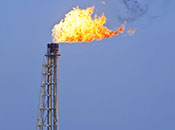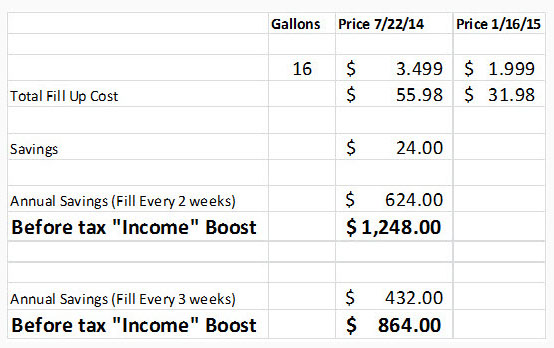
"For they sow the wind, and they shall reap the whirlwind." Josea 8:7
Will the Saudis now reap the whirlwind?
I thought this bit of recent commodity price history of interest. Income boost from today's gasoline prices versus what I paid on July 22, 2014 for regular gasoline at EZ Check (gasoline prices in Whippany, New Jersey).

To fill my Lexus in July (16 gallons) cost $55.98. To fill it last week cost me $31.98. This is a gigantic differential of 43%—magnified because it occurred entirely between the end of November and the 16th of January (two months) and because it is continuous. Anyone who drives regularly (fills up every two or three weeks) received this income boost courtesy of the Saudis and perhaps the U.S. government backdoor geopolitics. The Saudis have sown the wind.
Last week's U.S. Consumer confidence numbers were reported to be the highest since 2000.
Will U.S. consumers spend this unexpected and new income or save it? Therein lies the issue of economic recovery and very likely global economic recovery. How consumers view their new "income" makes the distinction between very heavy deflationary forces and omnipresent and, much desired by the Fed, inflation. The deflation versus inflation fight now climaxes.
Is there anything negative about this personal "income" boost? Well, if you are an oil producer, explorer, middle man or banker you are unhappy or at least worried. Hundreds of billions of dollars of high yield debt owed by drillers are in danger. The lending banks are running for cover. Investors in oil stocks must now be wary of dividend and capital expenditure cuts.
Budgets of oil producing countries, (four Provinces in Canada), Texas, North Dakota. Stability in several Middle Eastern and African dictatorships and monarchies are in danger as budgets shrink and social order is challenged.
Could Middle Eastern and Russian geopolitics, newly catalyzed by this Saudi oil production decision in November, restore the price of oil to a higher market clearing price level? A condition they desperately require?
Is there any complicity by the U.S. in fomenting this "income" decision by the Saudis?
Finally how long will this boost in income last? Do we now permanently have $40 to $50 oil as some suggest? Will we ever see $80 or $100 oil again?
What damage will occur to the U.S. fracking industry? Can U.S. technology lower the finding and extraction costs of this revolutionary new oil technology to challenge the OPEC decision?
What damage will the banking industry in Canada and Texas feel from defaults on their high yield debt portfolios?
Have the Saudis wrought the whirlwind in their effort to sustain the OPEC cartel energy dominance? Challenging American technology is a very risky endeavor indeed.
As our American forefather patriots (Christopher Gadsden) proclaimed, "Don’t Tread on Me" in their banners, American technology should not be discounted. Could fracking be profitable in select areas such as the Eagle Ford Shale at $30 or $40?
There are of course many, many important questions. The answers, in due course, will be evident by first quarter of 2016 once the oil hedges have largely expired.
Personally, I am an optimist when it comes to Canadian and American technology. We have seen this story before in 1987 and 1999 when oil prices fell much lower.
Mike Berry
Disruptive Discoveries Journal

























































